That would be great! Same issues here. Left has damage from working in clubs and tinnitus all around. I use my first gen AirPods Pro to fall a sleep. Just have some minor chatting podcast on so my focus is on the chatting in stead of the high pitch tone.Cool. The most exciting thing announced lol
I am a tiny bit deaf in my left ear. If only it could help with tinnitus which drives me crazy.
Got a tip for us?
Let us know
Become a MacRumors Supporter for $50/year with no ads, ability to filter front page stories, and private forums.
Apple Gearing Up to Add Hearing Aid Feature to AirPods Pro 2
- Thread starter MacRumors
- Start date
- Sort by reaction score
You are using an out of date browser. It may not display this or other websites correctly.
You should upgrade or use an alternative browser.
You should upgrade or use an alternative browser.
I cannot wait to try this out.
I'm not gonna use it all the time, but if I can "relieve" my Signia hearing aids every now and then, and get better, adjusted sound when listening on music (or other stuff) with my APP, then I'm happy.
If Apple also comes up with better tools for fighting tinnitus, then I'm REALLY happy. The Signias aren't very good for that...in my case, at least.
Also, if Apple disrupts the hearing aid industry a bit, forcing them to become better and/or cheaper, then I'm all for that.
I'm not gonna use it all the time, but if I can "relieve" my Signia hearing aids every now and then, and get better, adjusted sound when listening on music (or other stuff) with my APP, then I'm happy.
If Apple also comes up with better tools for fighting tinnitus, then I'm REALLY happy. The Signias aren't very good for that...in my case, at least.
Also, if Apple disrupts the hearing aid industry a bit, forcing them to become better and/or cheaper, then I'm all for that.
Exactly what was going through my head!"The NHS provides the same hearing aid brands that are available privately. Digital models that can be set to accurately match your hearing loss are now issued as standard on the NHS.
Depending on the type of hearing loss you have, you may not have a choice in the type of hearing aid you get (whether private or NHS).
You’ll usually be given a behind-the-ear aid from the NHS - this was the most common outcome for our survey respondents.
Hearing aids and earmoulds come in a range of different colours, so it's worth asking what is available."
My mother got some NHS hearing aids and they worked very well - but she had a problem remembering to wear them, changing batteries and actually looping the tubes round her ears. (This was a number of years ago - and they likely don't use that type any longer.)
For me, I don't think my hearing is bad enough to warrant the NHS paying a large sum for decent quality hearing aids. If I were in charge of the budget, I'd draw the line such that I didn't qualify!
Re tinnitus, I want to find out if devices do help. So far, ordinary earpods (with no fancy features) have only a marginal effect and the feeling when I stop listening to something of my tinnitus being worse.
I've seen reports on another forum ( Ars Technica I think ) that the Airpods Pro 2 are somewhat effective with regard to tinnitus ( depending on severity / frequency etc )Exactly what was going through my head!
My mother got some NHS hearing aids and they worked very well - but she had a problem remembering to wear them, changing batteries and actually looping the tubes round her ears. (This was a number of years ago - and they likely don't use that type any longer.)
For me, I don't think my hearing is bad enough to warrant the NHS paying a large sum for decent quality hearing aids. If I were in charge of the budget, I'd draw the line such that I didn't qualify!
Re tinnitus, I want to find out if devices do help. So far, ordinary earpods (with no fancy features) have only a marginal effect and the feeling when I stop listening to something of my tinnitus being worse.
I'm in exactly the same boat with regard to not wanting to go down the NHS route, and for the reasons you mention. Normal conversation is fine, it's just my grandaughter who I often struggle to hear.
Props to Apple for doing this.
Certainly gives an alternative for those who can’t spend a lot on traditional hearing aids. How well it works is yet to be determined, but it is still a good thing to have.
Certainly gives an alternative for those who can’t spend a lot on traditional hearing aids. How well it works is yet to be determined, but it is still a good thing to have.
You can add that hearing aid does not consume so much current and then the battery last 5/6 days in my case… And mine are a lot more expensive than the AirPods ProThere are lower priced hearing aids as an audiologist isn't required all the time.
I think Apple is trying to suggest these are hearing aid substitutes.
Insurance should cover hearing aids. My Medicare provider doesn't provide enough assistance.
Hearing aids should qualify just like glasses, which can also be under supported by insurance, especially Medicare.
I am quite curious to see how this works in the real world, not just speculation on the part of Apple.
But the interesting thing here is that it correct it when you use your AirPods, something is available for some time with accessibility setting but not the self test and you can enter only one curve and not one for each hear, because they are always different
It will be even interesting for people who don’t need hearing aid but with a small loss, it will be like an automatic equalizer !
This is a very good news, I use already the settings available in accessibility settings, but you can’t enter a response curve for the two hears.
Something to not forget though, traditional hearing aids battery last several days ! But the sound fidelity for music is not fantastic , then I prefer to use my AirPods for that, and in meeting the signal processing of voice is fantastic and the understanding of what people say is a lot better than with my very expensive hearing aids
Something to not forget though, traditional hearing aids battery last several days ! But the sound fidelity for music is not fantastic , then I prefer to use my AirPods for that, and in meeting the signal processing of voice is fantastic and the understanding of what people say is a lot better than with my very expensive hearing aids
Yes but the auto test is good, often our audiogram are olds … and you can enter only one curve at the moment, when your response curves are different for each hear*AirPods Pro have already supported audiogram-adjusted hearing for at least 2 years or since at least iOS 16. Apple just didn't say anything about it.
Traditional equalisation settings are a complete pain. Everything has its own approach ranging from simplistic bass and treble knobs to incredibly fancy graphical systems.it will be like an automatic equalizer !
But they all fall part because every one takes time and effort to find out what is possible, to make adjustments, to refine. Then you have to do the same again when there is a software/firmware update, you get new hardware, etc. As well as that sometimes the sound sources (e.g. radio or TV, streaming service, etc.) themselves vary hugely.
On top of that, two people in a room might have very different requirements. How do you approach that problem?
For all these reasons, I am very keen to give these Airpods a go. I am hoping to set up once for me and my hearing, leaving everything else on near-default settings. And only change when my hearing changes or if the software/firmware is updated and seems different. Will be interesting to find out how much they help as automatic equalizers!
The way it works today is that you can, through the accessibility settings (Audio & Visual section), activate a mode that adapts the sound to an audiogram curve you can input. This can be used while on the phone, listening to music, or even in transparency mode (similar to hearing aids).Traditional equalisation settings are a complete pain. Everything has its own approach ranging from simplistic bass and treble knobs to incredibly fancy graphical systems.
But they all fall part because every one takes time and effort to find out what is possible, to make adjustments, to refine. Then you have to do the same again when there is a software/firmware update, you get new hardware, etc. As well as that sometimes the sound sources (e.g. radio or TV, streaming service, etc.) themselves vary hugely.
On top of that, two people in a room might have very different requirements. How do you approach that problem?
For all these reasons, I am very keen to give these Airpods a go. I am hoping to set up once for me and my hearing, leaving everything else on near-default settings. And only change when my hearing changes or if the software/firmware is updated and seems different. Will be interesting to find out how much they help as automatic equalizers!
I’ve been using it for several years now. In the meantime, you can go to the Music app settings and choose an equalizer, which will be applied in addition to the hearing correction. The baseline is defined by the settings you entered in the accessibility options—nothing less, nothing more.
PS: English is not my mother tongue, improved by ChatGPT… waiting for AppleIntelligence
It's so easy my parents could figure out how to cover it. And they barely know how to update their phones.Absolutely brilliant putting each watermark entirely over solid color.
Your English is excellent - however you get there!The way it works today is that you can, through the accessibility settings (Audio & Visual section), activate a mode that adapts the sound to an audiogram curve you can input. This can be used while on the phone, listening to music, or even in transparency mode (similar to hearing aids).
I’ve been using it for several years now. In the meantime, you can go to the Music app settings and choose an equalizer, which will be applied in addition to the hearing correction. The baseline is defined by the settings you entered in the accessibility options—nothing less, nothing more.
PS: English is not my mother tongue, improved by ChatGPT… waiting for AppleIntelligence
The equaliser has potential - but I cannot see if it is possible to make it work on podcasts, YouTube videos, etc.
"The NHS provides the same hearing aid brands that are available privately. Digital models that can be set to accurately match your hearing loss are now issued as standard on the NHS.
Depending on the type of hearing loss you have, you may not have a choice in the type of hearing aid you get (whether private or NHS).
You’ll usually be given a behind-the-ear aid from the NHS - this was the most common outcome for our survey respondents.
Hearing aids and earmoulds come in a range of different colours, so it's worth asking what is available."
The two ladies I know who have hearing aids paid an absolute fortune for them (privately), as they are quite fashion-conscious* and wouldn't be seen dead with the behind-the-ear variety. The NHS doubtlessly relies on large numbers of patients making the same decision to keep costs down. They do a similar thing with cataract lens replacements.
I can't say I blame the NHS for that. It's a public service and has to be paid for via taxation.
*I did ask my friend about this, and she expressed great interest in the AirPods.
Is it going to be available in the UK?If it works well, it could be a killer feature in the UK. I have two friends who have spent literally multiple thousands of pounds on hearing aids.
How do you enable it? I’ve activated the Developer mode on the iPhone and AirPods but the AirPods Pro 2 firmware is not updating for devs as indicated in an article by iDownloadBlog
What version of AirPods Pro 2 firmware do you have?How do you enable it? I’ve activated the Developer mode on the iPhone and AirPods but the AirPods Pro 2 firmware is not updating for devs as indicated in an article by iDownloadBlog
I can’t get it working either. Wonder where the hidden option is?
When taking the test are the sounds coming from the iPhone or do you need to already own the pro2?
Apple is working behind the scenes to get ready to introduce Hearing Assistance functionality to the AirPods Pro 2. The latest iOS 18.1 beta does not have the feature enabled at the current time, but it is hidden in the update and Apple could potentially activate it in a future iOS 18.1 beta.
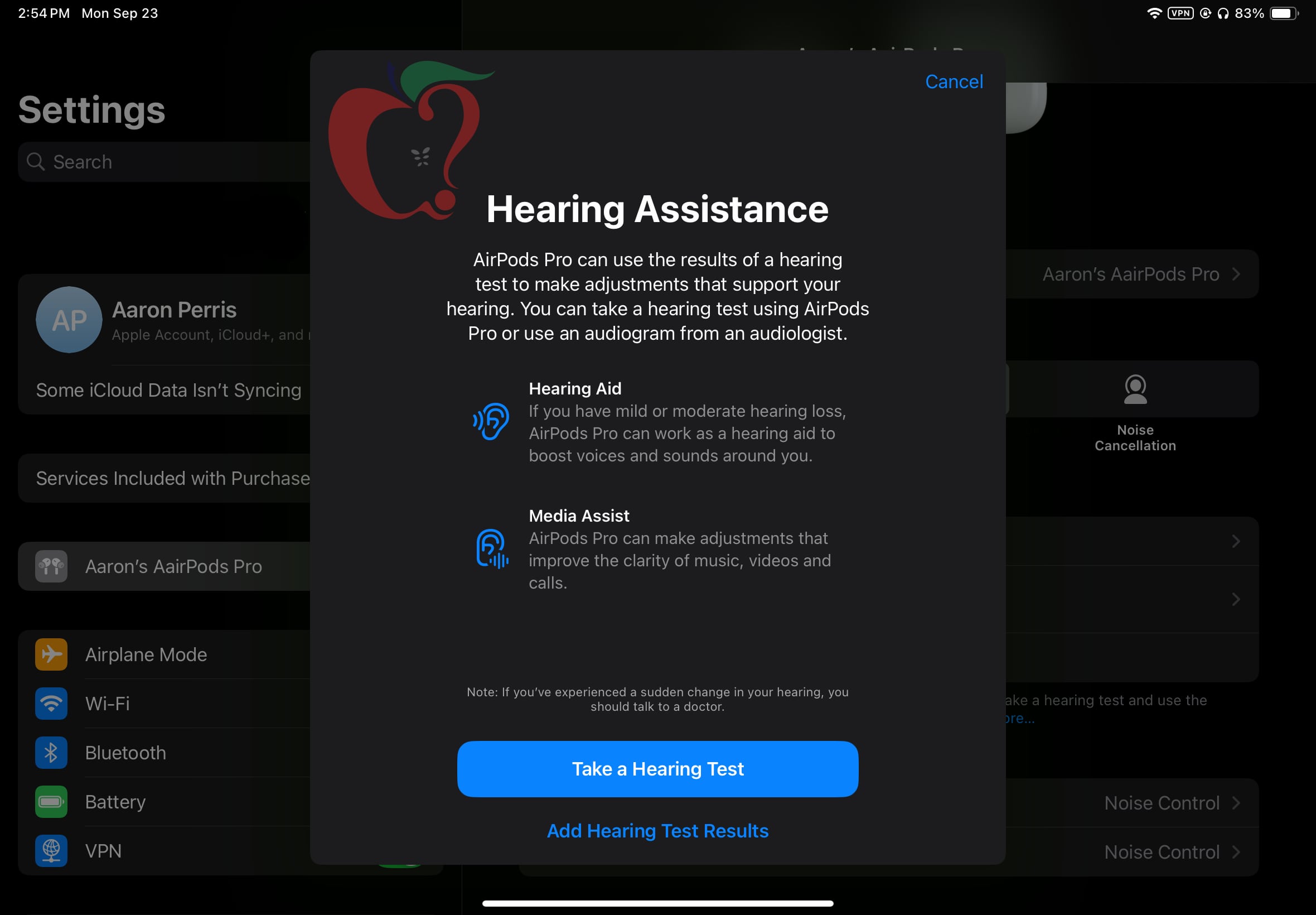
We were able to access the hidden AirPods Pro 2 Hearing Assistance feature set in the fifth iOS 18.1 and iPadOS 18.1 betas, and we tested it out.
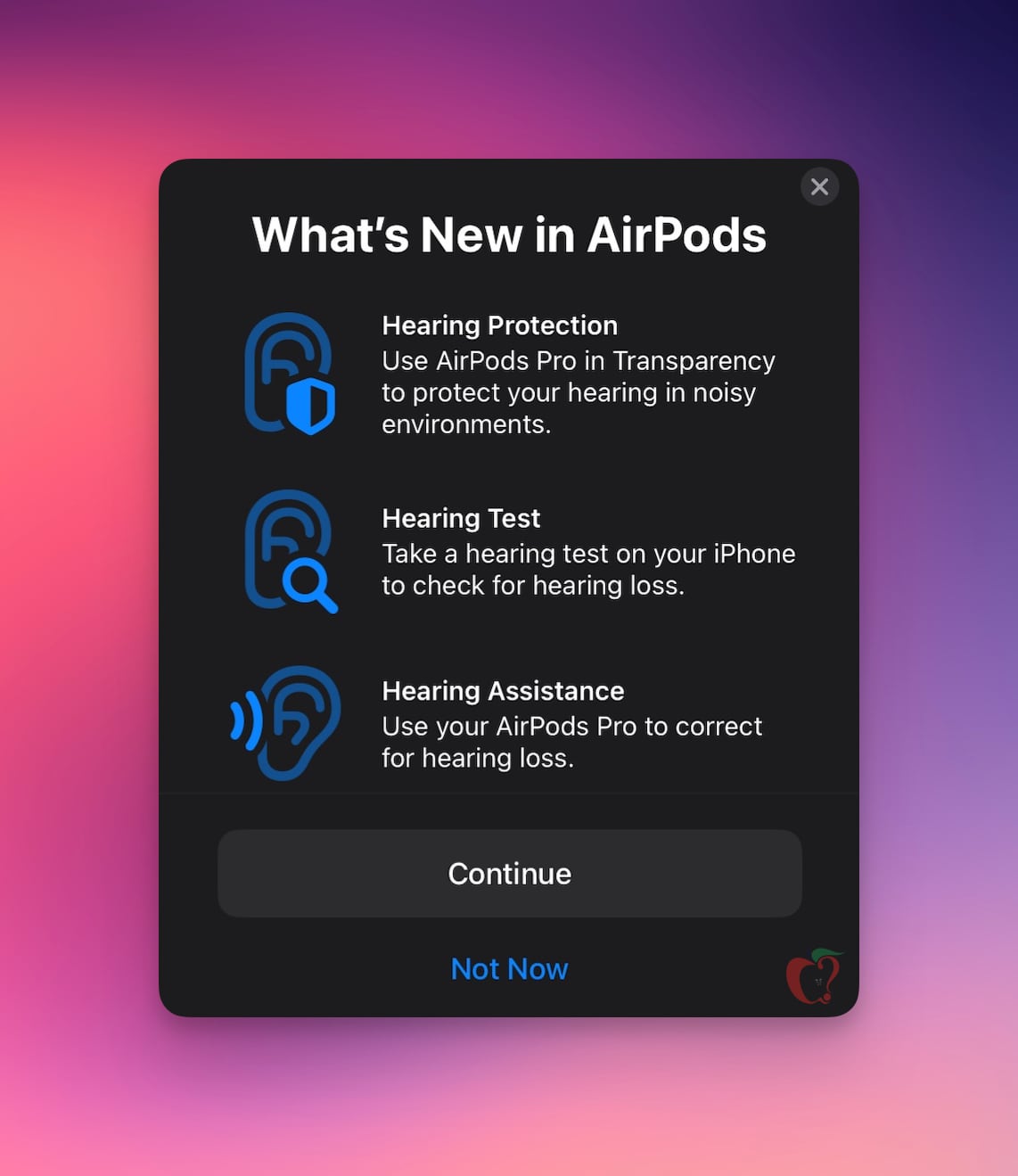
When Hearing Assistance launches, users will be prompted to take a hearing test or upload an audiogram from an audiologist. Apple says the results will be used to turn on a hearing aid feature for those with mild to moderate hearing loss, but for all users, it can be used to make sound adjustments to improve music, video, and call clarity.
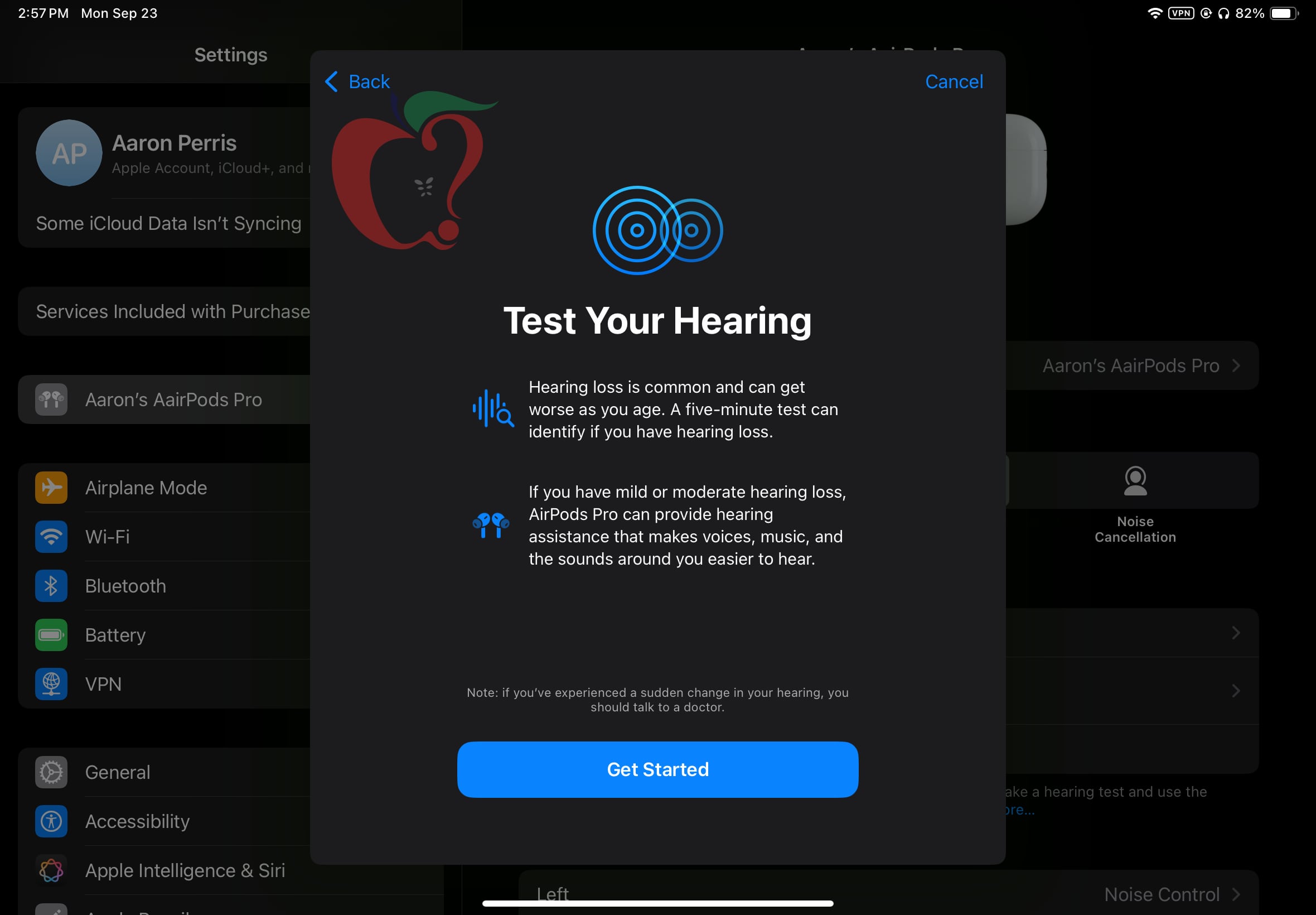
The test takes approximately five minutes to complete, and it prompts users to tap the screen each time they hear a tone. The AirPods Pro 2 are only recommended for mild to moderate hearing loss, and those with more serious hearing loss likely won't be able to use the Hearing Aid feature.
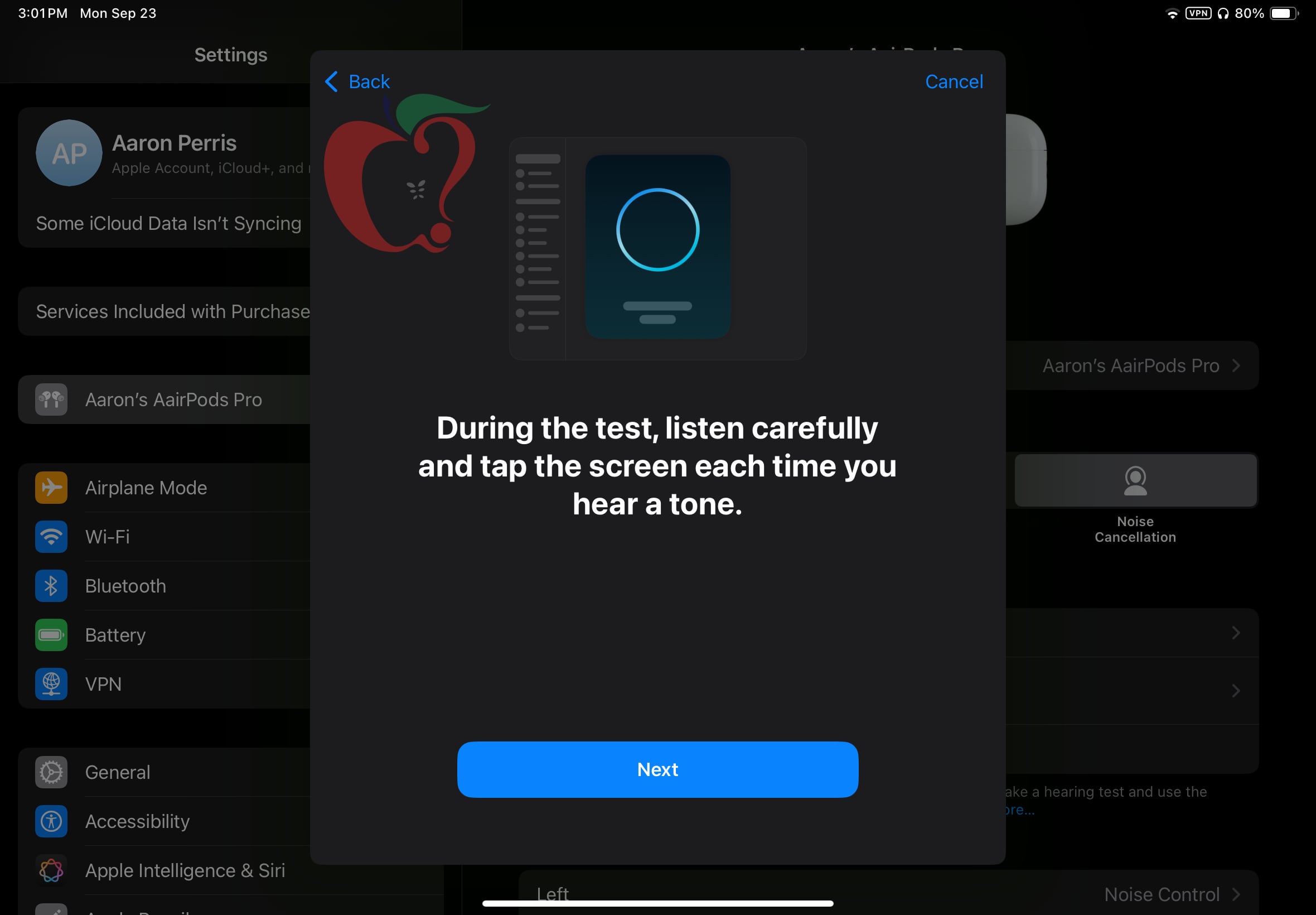
After the hearing test, users will have the option to turn on the Hearing Aid option if it is required. Hearing Aid adjusts the voices and sounds around the user to account for the tones and frequencies that are not able to be heard.
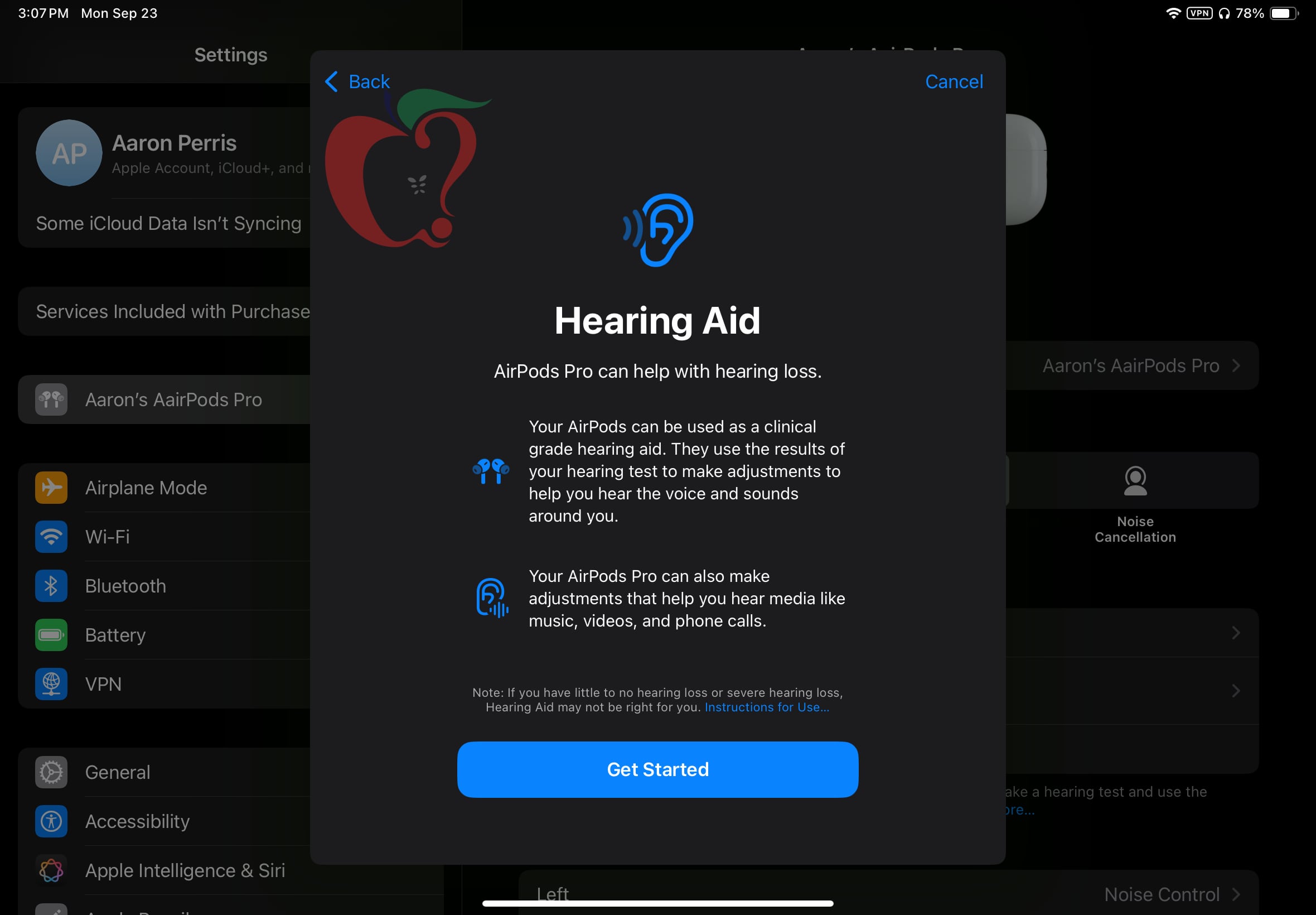
Apple has already received FDA authorization for the AirPods Pro 2 to function as an over-the-counter hearing aid, and it could be rolled out at any time. Apple has said the feature will come out this fall, so it would make sense for it to be introduced in a future iOS 18.1 beta.
Article Link: Apple Gearing Up to Add Hearing Aid Feature to AirPods Pro 2
You need a Pro 2When taking the test are the sounds coming from the iPhone or do you need to already own the pro2?
So I can buy pro2 now and take smaller hearing test? I am totally unfamilar about pro2 the hearing and fda approval got my attention . Im 77 so I do have hearing loss and also tinnitusIt should help give some relief to tinnitus, I suffer from it and I do get relief from using the AirPods Pro 2 as hearing aids as well as using prescription hearing aids. You can already setup the AirPods as aids using the Mimi app for a hearing test which produces an audiogram that can be added to the iPhone to adjust the sound output.
you can use the Mimi app to do the hearing test on the iPhone now. I would suggest looking on YouTube how to setup AirPods Pro 2 as hearing aids, this will show you how to go through the process. AirPods do help with tinnitus relief and hearing loss, sounds are amplified, but I don't think I could wear them all day, I tend to wear them when I'm dog walking, the rest of the time I wear normal hearing aids. I would defiantly try AirPods Pro 2 though.So I can buy pro2 now and take smaller hearing test? I am totally unfamilar about pro2 the hearing and fda approval got my attention . Im 77 so I do have hearing loss and also tinnitus
Is it going to be available in the UK?
There are slight difference between the US and UK versions of the online App Store page. The UK page says
"Coming soon
Hearing health. Minimise your exposure to loud noise levels with Loud Sound Reduction, use Conversation Boost to focus on voices directly in front of you, and play calming Background Sounds — like the ocean or rain — to mask unwanted environmental noise."
The US page says
"Coming soon
Hearing health. AirPods Pro 2 unlock the world’s first all-in-one hearing health experience. It provides a scientifically validated Hearing Test, a clinical-grade Hearing Aid capability, and active Hearing Protection — all available with a free software update on your iPhone or iPad."
I imagine there are different regulatory hurdles to overcome in different markets before a producer can claim that something is "clinical-grade".
This will be a benefit even for those who have prescribed hearing aids.
AirPods can be a substitute in case hearing aids are lost, damaged or the batteries depleted.
They can be a preferred option when regular hearing aids are the type that don’t seal off the ear canal and provide noise cancellation. Air travel and noisy restaurants come to mind as circumstances when AirPods may be better suited.
AirPods can be a substitute in case hearing aids are lost, damaged or the batteries depleted.
They can be a preferred option when regular hearing aids are the type that don’t seal off the ear canal and provide noise cancellation. Air travel and noisy restaurants come to mind as circumstances when AirPods may be better suited.
Could someone explain why it is not available to AirPods Pro V1? Only marketing or technical limitation?
The AirPods Pro 2 have the newer H2 chip...
Register on MacRumors! This sidebar will go away, and you'll see fewer ads.


